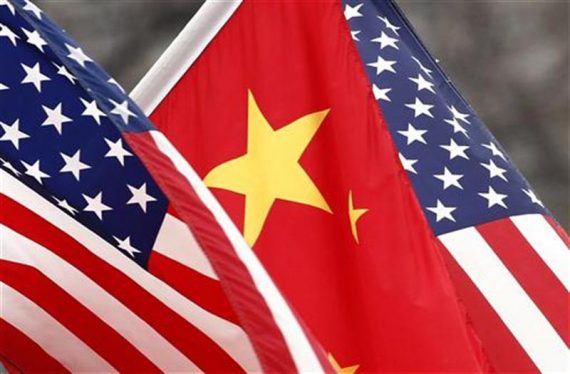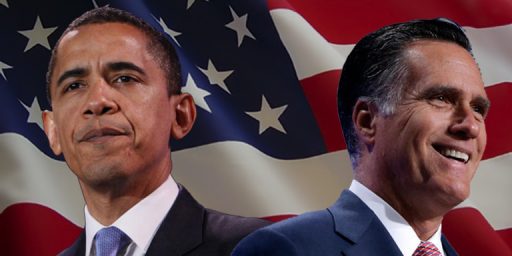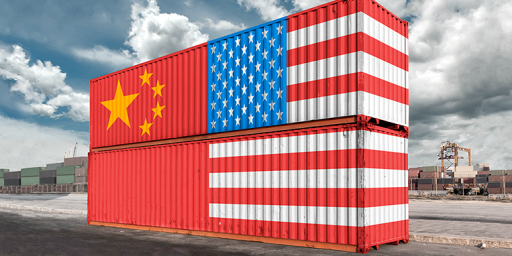China Is Every American Politician’s Favorite Scapegoat
American politicians are using China as a scapegoat for America's problems.
Dave Schuler noted early today that Mitt Romney hit fairly hard on China’s currency manipulation during last night’s debate. I tend to agree with Dave that it’s somewhat disturbing to see the campaign take this tone, but as I noted in a comment, bashing China is something both candidates are doing, largely for purely political purposes:
Tonight, like throughout much of the campaign, there has been a battle to see who is toughest on China. Both Romney and Obama say that China doesn’t play by the rules in international trade. Romney says he will declare China a currency manipulator – potentially leading to tariffs – while Obama says he has filed cases against China for unfair trade practices. Obama has declined to declare China a currency manipulator.
The back-and-forth is to be expected. Presidential candidates – including Obama in 2008 — have long sought to win votes by attacking China as a bogeyman and blaming the country for the United States’ economic woes. There is plenty of evidence that China has not played by the rules, but presidents – including Obama and George W. Bush – tend to take a far more diplomatic line when they’re elected.
Zachary Goldfarb, who wrote the piece quoted about, argued in an earlier piece that pointed out that it really isn’t accurate to blame China for America’s current economic problems:
More than ever, these attacks are counterproductive, distort a robust and ever more entwined China-U.S. economic relationship, and distract from the real challenges facing U.S businesses, which have little to do with China and everything to do with the continued viability, competitiveness and innovation of the American economic system.
China is a larger and more important market for U.S. companies than ever. Even as the pace of growth in China moderates, Chinese consumers flock to U.S. brands as diverse as KFC and General Motors, Intel and Walmart, IMAX and iPhones.
If you ask, many executives will say it is easier to do business in China than it was a decade ago (though harder than it was five years ago) and is still much more straightforward than in many other parts of the world, such as India. For Americans in general, however, views of China are amplified by anxiety about the slow economic recovery in the United States. A more confident America in the mid-2000s was less troubled by hurdles to doing business in China than a more anxious America is about lower — but still formidable — hurdles today.
(….)
Ultimately, what is framed as contest between the United States and China will be determined not in courts of law adjudicating patents, not by the World Trade Organization hearing complaints, and not by Chinese ideologues or Congress and the White House alternating platitudes with injunctions. It will be determined by the vibrancy of each economic system.
If American companies such as Apple continue to invent and produce devices that enrich individual lives and enthrall consumers young and old, they will find riches in China.
If American entrepreneurs and businesses large and small continue to offer solutions that everyone wants and needs — whether new ways of producing energy, more efficient ways of manufacturing goods or better systems of management — then the Chinese will do what they have been doing for two decades: be a partner and a market.
If China accumulates dollars based on the flow of trade, and if America remains a place where investments are transparent and markets are attractive, those dollars will flow back into the United States, perhaps in the form of buying Treasury securities but far more preferably in the form of China investing directly here. It already has, and mayors and governors across America shy away from the rhetoric of Washington because they recognize how needed, valuable and potent such investment is.
Whether China is a long-term threat, therefore, has as much to do with choices made by Americans as decisions made by the Chinese. Americans can only marginally affect what China does, but Americans can maximally determine the future arc of the United States.
If innovation is nurtured and a sense of optimism about the limitless possibilities of the future is maintained, then China represents only more of an opportunity for U.S. prosperity. You wouldn’t glean that from the content of the debate, and it’s possible that if today’s harsh words translate into tomorrow’s harsh policies, the relationship will be damaged so severely that those opportunities evaporate. We are not there yet, by a long shot, but it would be better to steer in a different direction before we end up somewhere we do not want to be.
All of this should be very familiar to anyone who remembers the 1980’s of course. Back then, it was the Japanese who were going to be taking us over. Their car companies were taking over larger and larger segments of the American automobile market, mostly because they were making far better cars than American companies. Companies like Sony were introducing electronics innovations seemingly every years. And, then, the Japanese came to the U.S. and started buying our real estate, including iconic American places like Rockefeller Center. Books and magazine articles were being written about how the Japanese were going to overtake us as the world’s leading economic power. In retrospect, it seems like a silly episode in our history. Did anyone ever really think that a nation made up of islands which has to import nearly all the raw materials necessary for an industrial nation to survive was going to become the leading economy in the world? Moreover, if anyone had paid attention to the demographics of Japan thirty years ago and compared them to ours, they would have realized that the rapid rise that country was experiencing back then couldn’t last forever. Japan is still a powerful economic force, and it’s going to remain one, but it never really was a threat to us.
The same, I would argue, goes for China. It’s rather obvious that the United States and China have competing economic interests in many respects, but that’s something that’s true of the U.S. and pretty much every other nation on the planet. Even our closest trading partners, Canada and Mexico, often have divergent economic interests from us. That doesn’t mean that we can’t cooperate with them and have a mutually beneficial trade relationship with them, though, and it doesn’t mean that we cannot have a similar relationship with China. Indeed, we are largely at the point now where we pretty much need each other, although it would likely be easier for us to survive without China than it would be for China to survive without us.
More importantly, our relationship with China benefits us far more than people realize:
Take the controversial case of Apple making its phones and tablets at Foxconn factories in Shenzhen. Labor issues at those plants have come under intense criticism. But the reality is more complicated, given that wages at those plants are well above average for Chinese workers and that Foxconn’s managers have been more transparent and more responsive to international criticism and pressure than American companies were in the company-town days of the late 19th and early 20th centuries, or many Mexican companies were during the brief heyday of the maquiladoras in the 1990s. That is no excuse for abusive labor practices, but the issue of labor conditions speaks as much to American ambivalence about sourcing in China as it does to actual conditions at these factories.
As for who benefits from the trade, when those phones enter the port of Long Beach, Calif., they show up as imports from China. But only a fraction of the stated value actually goes to China. The full retail price of the iPhone 5 may be $649, but manufacturing costs are less than $10 per phone. Components are another $200, and most of those revenues go to U.S. and foreign tech firms such as Texas Instrument and Infineon that produce the designs and intellectual property.
You can do similar calculations for Nike shoes, Coach bags and Walmart supplies. Of the $13.5 billion in Nike footwear sales in fiscal 2012, a third of the shoes were made in China, at a cost of about $1.8 billion. In short, a huge portion of U.S. imports from China benefits not China but U.S. companies.
And, in turn, U.S. workers and consumers.
We do need to be careful about China in some respects, of course. The amount of piracy of American intellectual property that takes place there is rather astounding and an issue that the Chinese government doesn’t seem all that concerned about. We ought to be using the leverage that our relationship with China creates to force them to act in that regard. Indeed, if China wishes to be considered part of the world trading community, they have an obligation to police intellectual property theft far more than they’re doing right now. On the whole, though, there is far more beneficial about our relationship with China than there is detrimental, and it’s time for politicians like Obama and Romney to stop using the country as a political whipping boy.







The US always needs both a military and an economic enemy. In the 80’s it was Japan and the USSR. In the 1990’s it was Mexico and Iraq. Today it’s China and Iran.
It’l probably be India and maybe Pakistan next decade.
To mention the piracy thing as a concern without mentioning the two gargantuan elephants in the room — the amount of Treasury debt they own; the Taiwan dispute — is sort of amazing. And by “amazing” I mean, well, I won’t say it. I’m not in a hostile mood.
Scapegoating has been part of politics for as long as there’s been politics. It plays to the lowest common denominator. That wins votes. Sigh.
Just for shits and giggles, imagine if we sat down with China and worked out this deal: (1) We quadruple our domestic oil production over the next decade, (2) we sell to them far below market priced oil in increasing percentages per annum of their annual oil requirement, (3) in exchange for the cheap oil they also agree to purchase by increasing percentages vast quantities of manufactured industrial goods from U.S. suppliers, e.g., locomotives, turbines, boilers and furnaces, car parts, engines, prefabricated building parts, etc., (4) they agree not to bulk sell any of their Treasury holdings at any time, regardless of bond market conditions.
They get cheap oil. We get manufacturing jobs and manufacturing exports. They get high quality parts and equipment. We avoid a sudden spike in our debt servicing costs.
Why can’t we be frenemies?
The bitching and griping I heard about this was endless.
I would look the whiners in the eye and say “Well, if it wasn’t for the greedy Americans selling their property to the Japanese, it would not be a problem.”
Most times the only response I got was a vacuous stare.
Here we agree. Both guys are attacking China because its politically helpful, and frankly, they need to stop. I imagine that after the election, they’ll go to China and say , “Hey, we were just foolin’. Pay no attention to anything said during the US election season.”
That said, China did engage in currency manipulation to our detriment. That happened.
@ernieyeball:
And, of course, most of those venerable real estate purchases have been reversed over the past 20 years. Rockefeller Center, for one, ended up back in U.S. ownership relatively quickly, and the Japanese buyers ended up selling it a loss.
Frankly, we should conquer Mexico, Canada, and Australia. The only wars left to the U.S. that it can prosecute without error are expansionary wars. Honestly, Canada and Mexico could probably be annexed by treaty, like the Acts of Union. Australia’s definitely a war though.
@Tsar Nicholas:
You realize, of course, that China is nowhere near being the largest holder of US debt; and even if you only count foreign government owners, they are about to be overtaken by Japan, don’t you?
Now, you probably don’t.
“No” rather than “now”, of course.
@Doug Mataconis:
The best take on Japanese real estate purchases I heard was that they couldn’t take it home with them.
@Tillman: Uuuuh. That’s what Romney’s Navy build-up is for. Sneaky!
@Tillman: I’m sure you will gladly accept the post of Chief of the New New Mexico State Police.
My major complaint with out sourced products is quality. I used to be able to buy a set of quality Egyptian cotton sheets made in the US and they we last for 6 years or more. Today I’m lucky to get 2 years out of the same brand made in India. A few years ago I replaced and American made kitchen faucet fixture that was over 20 years old with the same brand made in China – it lasted 2 years. The replacement , also from China, was an out of box failure. The companies may be getting a good deal but the consumers are not.
I was in Japan during most of the “aaaah the Japanese are going to take us over!!!” Those of us who actually worked there found the hysteria amped by panderers like Michael Crichton in Rising Sun to be, well, hysterical. I have always described Japanese company management strategy along the lines of: “innumerate meetings at which deck-chair arranging is all that gets done until just before the final deadline, at which point everyone panics.”
While Japan and China have similar demographics, we have to remember that Japan in the 1980’s was (and still somewhat is) basically a vassal state that we allowed to engage in trade and become titans in certain industries as long as they were politically and militarily obedient. Japan is more dependent than China will ever be on raw materials imports and they are limited by their position as an island chain as opposed to being a gigantic continental sized state like the U.S. or Russia. Furthermore, China’s 1.35 billion population gives them a much larger potential workforce and consumer base than Japan could have ever dreamed of. Basically economies of scale are China’s friend.
However this doesn’t mean America is doomed. We simply need to be prudent and acknowledge that globalization in its current iteration once aided us (post-WWII to secure alliances), but is now somewhat harmful as it has quickly eroded our industrial base. Of particular import would be our essentially dead machine tools industry, this is problematic as machine tools are the backbone of modern manufacturing.
I went google searching for the auto workers smashing up a Toyota (or was it one of the other Japanese Demons) to illustrate American Labor’s measured response to foreign competition at the time.
The word smashing in the search field led me to this, which I had forgotten about.
http://crasstalk.com/2011/06/29-years-later-remembering-vincent-chin/
I think I am going puke. Again.
@Tsar Nicholas: Uh, didn’t we do that with the Japanese in the ’20s and ’30s?
@ernieyeball: I wasn’t aware of that case.
Disgusting.
@grumpy realist: I’ve never read “Rising Sun”, but from the synopsis online, it doesn’t seem to be that far off from Tom Clancy’s (laughable) “Debt of Honor”.
I totally agree we should invade Canada and Mexico. In addition to the cards, we’ll get an additional five armies per turn, which will be helpful when we need to invade China via Kamchatka
Greetings:
I think that you’re right, not that the ChiComs wouldn’t mind doing us as much mischief as as possible as often as possible.
Allegorically, it reminds me of those Muslim politicians and the Jews.
I love this stuff:
Meanwhile, back at Rancho Realidad:
I was going to say that the article below was about a better scapegoat, but that’s backwards. It is about a better cause. It can’t be a scapegoat though, because it is politically untouchable.
Housing Prices and Income Inequality
It has a very good explanation of how our national policy of higher home prices impacts our long term economic growth.
As much as we try, we can’t really make a healthy economy out of a re-inflated housing bubble.
@Timothy Watson: Trying to turn the Japanese into eagle-eyed stern-eyed business baddies, yes indeed. I do have a soft spot in my heart for Rising Sun because a critical point of the plot hinged on the use by Japanese of supercomputers to create fake pictures. Again something causing great merriment for those of us who had dealt with the average level of computer technology capabilities in Japanese businesses….
Based on my experience working for the Japanese government and Japanese businesses, there is an unwritten regulation that states every single bloody article explaining any form of policy, economic or otherwise, MUST start off with the sentence: “Japan is a small island nation with few natural resources.”